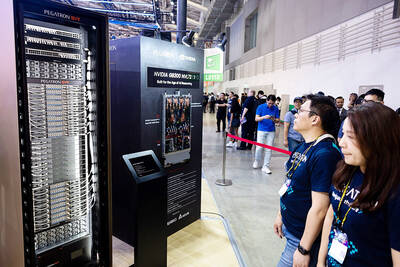E-paper display supplier E Ink Holdings Inc (元太科技) yesterday posted 25.48 percent annual growth in net profit for last year, as demand for higher-margin e-paper for electronic shelf labels (ESL) offset sliding e-reader demand.
Net profit jumped to NT$2.61 billion (US$84.59 million) last year, compared with NT$2.08 billion in 2017. Earnings per share climbed to NT$2.32 from NT$1.85.
The company’s board of directors has approved a proposal to distribute a cash dividend of NT$2.1 per share, representing a payout ratio of 90.52 percent.
With strong ESL growth momentum extending into this year, E Ink said it was confident that revenue would regain growth momentum this year, after posting NT$14.21 billion last year — an annual contraction of 6.58 percent.
The Hsinchu-based company attributed the decline primarily to weaker-than-expected shipments of e-paper displays for e-readers. The e-paper supplier counts Amazon.com Inc as one of its major e-reader clients.
The prospects for e-readers are likely to remain bleak in the first half of this year, E Ink said.
That would lead to “a single-digit drop in revenue in the first half [of this year]. Our major customer in the consumer electronics [CE] segment is relatively conservative about placing orders,” E Ink president Johnson Lee (李政昊) told a teleconference with investors yesterday.
The CE segment is comprised of e-paper displays used mostly in e-readers, the cash cow of the company, E Ink said, adding that the segment contributed more than 70 percent to the company’s total revenue last year.
The company’s Internet of Things (IoT) business — which is comprised of e-paper displays used in ESL, luggage and signage — made up the remainder, it said.
“We still believe this year’s combined CE and IoT revenue will surpass last year. We have a high level of confidence [about achieving the goal],” Lee said.
“This year ... about 70 percent to 80 percent of our ESL capacity is booked by clients,” Lee said.
To cope with increasing demand, E Ink plans to convert its US factory to produce ESL e-paper displays, Lee said.
The US fab, which is currently running at low utilization, produces e-paper displays used in e-readers, he said.
On the downside, E Ink said that royalty income would decline this year from last year’s NT$2.36 billion, extending a downtrend.
Last year’s decline was partly due to reduced shipments from financially troubled Chunghwa Picture Tubes Ltd (CPT, 中華映管), E Ink said, adding that the impact might be bigger this year.
CPT is one of the major LCD panel makers that licenses E Ink’s high-resolution fringe-field switching LCD technology to make high-definition displays. CPT briefly suspended production in December last year due to cash problems.
Use of fringe-field switching technology is waning as OLED technology slowly replaces LCD technology, E Ink said.

AI TALENT: No financial details were released about the deal, in which top Groq executives, including its CEO, would join Nvidia to help advance the technology Nvidia Corp has agreed to a licensing deal with artificial intelligence (AI) start-up Groq, furthering its investments in companies connected to the AI boom and gaining the right to add a new type of technology to its products. The world’s largest publicly traded company has paid for the right to use Groq’s technology and is to integrate its chip design into future products. Some of the start-up’s executives are leaving to join Nvidia to help with that effort, the companies said. Groq would continue as an independent company with a new chief executive, it said on Wednesday in a post on its Web

RESPONSE: The Japanese Ministry of Finance might have to intervene in the currency markets should the yen keep weakening toward the 160 level against the US dollar Japan’s chief currency official yesterday sent a warning on recent foreign exchange moves, after the yen weakened against the US dollar following Friday last week’s Bank of Japan (BOJ) decision. “We’re seeing one-directional, sudden moves especially after last week’s monetary policy meeting, so I’m deeply concerned,” Japanese Vice Finance Minister for International Affairs Atsushi Mimura told reporters. “We’d like to take appropriate responses against excessive moves.” The central bank on Friday raised its benchmark interest rate to the highest in 30 years, but Bank of Japan Governor Kazuo Ueda chose to keep his options open rather than bolster the yen,

Even as the US is embarked on a bitter rivalry with China over the deployment of artificial intelligence (AI), Chinese technology is quietly making inroads into the US market. Despite considerable geopolitical tensions, Chinese open-source AI models are winning over a growing number of programmers and companies in the US. These are different from the closed generative AI models that have become household names — ChatGPT-maker OpenAI or Google’s Gemini — whose inner workings are fiercely protected. In contrast, “open” models offered by many Chinese rivals, from Alibaba (阿里巴巴) to DeepSeek (深度求索), allow programmers to customize parts of the software to suit their

Global server shipments are expected to surge to 15 million units next year, from 4 million units this year, with artificial intelligence (AI) servers accounting for about 30 percent, driven by massive capital spending by major cloud service providers, the Market Intelligence and Consulting Institute (MIC) said on Thursday last week. Major cloud service providers — including Google’s parent company Alphabet Inc, Microsoft Corp, Amazon.com Inc and Meta Platforms Inc — are projected to budget US$450 million for capital expenditure next year, up from US$400 million this year, MIC ICT [information and communications technology] Industry Research Center director Edward Lin